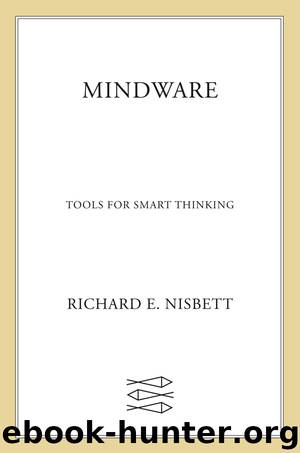Mindware by Richard E. Nisbett

Author:Richard E. Nisbett
Language: eng
Format: epub
ISBN: 9780374710675
Publisher: Farrar, Straus and Giroux
From Natural to Proper Experiments
Natural experiments can have tremendously important implications that beg to be studied by proper experiments.
Children of parents with little education, and who are therefore at risk for low academic achievement themselves, are likely to have a poor elementary school outcome if their first-grade teacher, judged by observers, is in the bottom third of teaching effectiveness. If they’re lucky enough to get a teacher in the top third of effectiveness, their performance is likely to nearly equal the performance of middle-class children.8 This finding constitutes a natural experiment. If children were to be randomly assigned to classrooms with teachers of different judged competence, we would have a true experiment. Meanwhile, what parent would be indifferent to teacher effectiveness after hearing about the result of the natural experiment?
Greenery in a city is nice. Nicer than you might assume, actually. A study of identical public housing apartment dwellings in Chicago found about half as many reported crimes in apartment houses surrounded by greenery as in apartment houses surrounded by barren land or concrete.9 In light of the sort of subtle situational cues that can profoundly affect behavior, discussed in Chapter 1, this is not such a surprising finding. The study is probably a real experiment because housing officials in Chicago believe that assignments to a particular project are made randomly—and there’s no reason to assume that’s not correct. On the other hand, laypeople don’t necessarily mean the same thing by the term “random” as scientists do, so complete confidence in the greenery/low crime hypothesis awaits a study with verifiably random assignment to dwelling to rule out the possibility that the relationship between greenery and crime is causal and not merely correlational. Obviously, such an experiment is sorely needed. If the true experiment findings duplicate the natural experiment findings, a cost-benefit analysis of the kind discussed in Chapter 4 would be badly needed. Such a study would examine the effects of ripping up concrete and putting in trees and weigh them against the cost in dollars. The analysis might show that the landscape change is a bargain for a city.
Scientists often get their ideas when they realize that some observation they’ve made constitutes a natural experiment. The eighteenth-century physician Edward Jenner noticed that milkmaids rarely got smallpox, a disease related to the cowpox to which the milkmaids would have been exposed. Maybe milkmaids were less likely to get smallpox than butter churners because cowpox somehow protected against smallpox. Jenner found a young milkmaid with cowpox on her hand and inoculated an eight-year-old boy with some material from it. The boy developed a fever and discomfort in his armpits. A few days later, Jenner inoculated the boy with smallpox from a lesion from a smallpox sufferer. The boy did not develop the disease, and Jenner correctly announced that he had discovered a treatment that could prevent smallpox. The Latin word for cow is vacca, and Latin for cowpox is vaccinia, so Jenner called his treatment vaccination. A natural experiment led to a proper experiment, and the results changed the world for the better.
Download
This site does not store any files on its server. We only index and link to content provided by other sites. Please contact the content providers to delete copyright contents if any and email us, we'll remove relevant links or contents immediately.
| Administration & Medicine Economics | Allied Health Professions |
| Basic Sciences | Dentistry |
| History | Medical Informatics |
| Medicine | Nursing |
| Pharmacology | Psychology |
| Research | Veterinary Medicine |
The Art of Thinking Clearly by Rolf Dobelli(10417)
The 5 Love Languages: The Secret to Love That Lasts by Gary Chapman(9782)
Mindhunter: Inside the FBI's Elite Serial Crime Unit by John E. Douglas & Mark Olshaker(9313)
Becoming Supernatural by Dr. Joe Dispenza(8196)
Nudge - Improving Decisions about Health, Wealth, and Happiness by Thaler Sunstein(7689)
The Road Less Traveled by M. Scott Peck(7591)
Mastermind: How to Think Like Sherlock Holmes by Maria Konnikova(7313)
Enlightenment Now: The Case for Reason, Science, Humanism, and Progress by Steven Pinker(7305)
Win Bigly by Scott Adams(7183)
The Way of Zen by Alan W. Watts(6594)
Factfulness: Ten Reasons We're Wrong About the World – and Why Things Are Better Than You Think by Hans Rosling(4729)
The State of Affairs by Esther Perel(4710)
Gerald's Game by Stephen King(4639)
Man's Search for Meaning by Viktor Frankl(4573)
The Confidence Code by Katty Kay(4248)
Thinking in Bets by Annie Duke(4216)
The Healing Self by Deepak Chopra(3568)
Hidden Persuasion: 33 psychological influence techniques in advertising by Marc Andrews & Matthijs van Leeuwen & Rick van Baaren(3549)
The Worm at the Core by Sheldon Solomon(3483)
